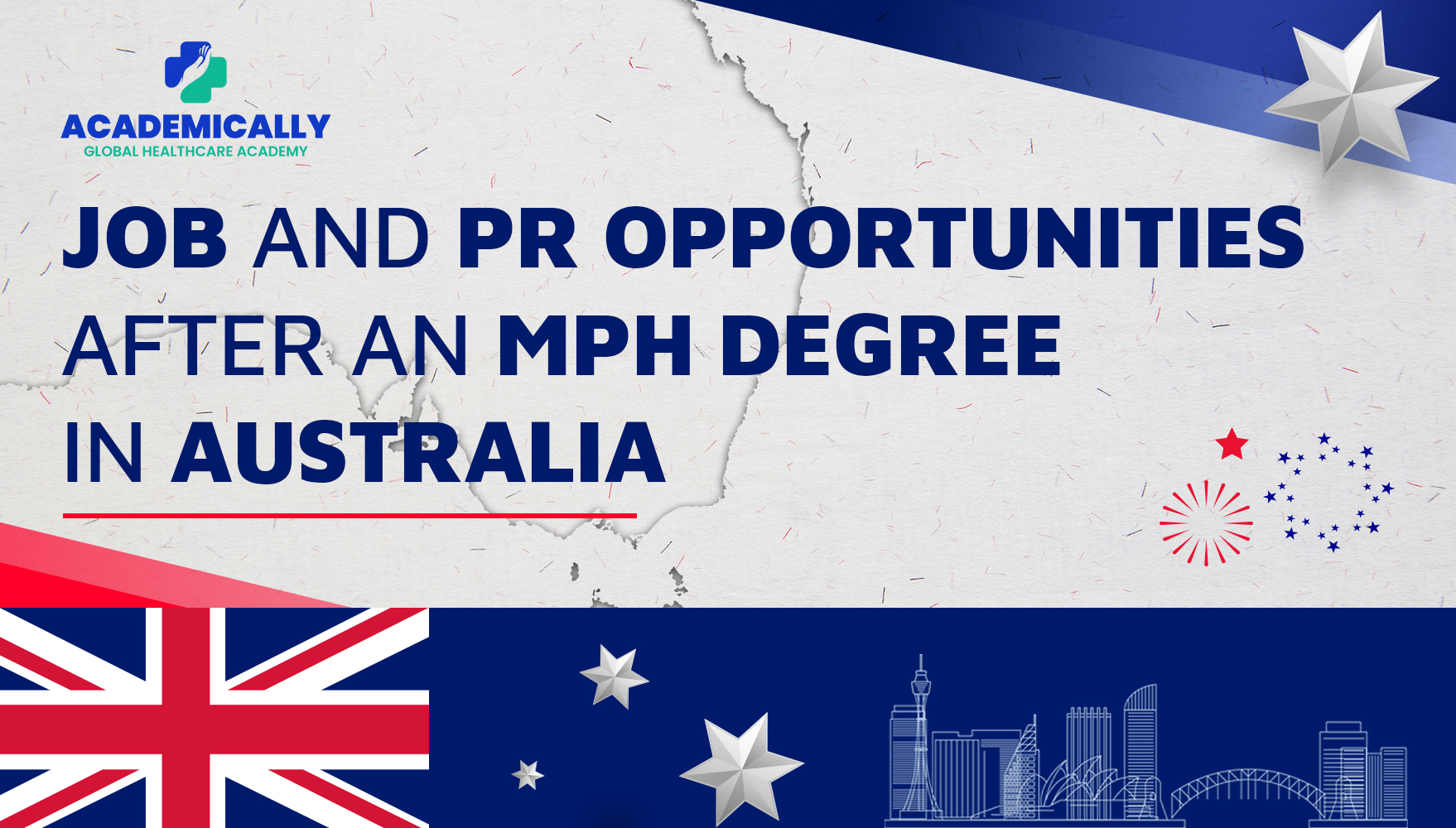What is the Master of Public Health (MPH) Degree?
The Master of Public Health (MPH) is a degree that prepares students for a wide range of roles in public health and related fields. Offered by many reputable Australian universities, including budget-friendly options like the Australian Catholic University, the MPH provides a strong foundation in public health principles, epidemiology, biostatistics, and health policy.
The course is designed to equip graduates with the skills needed to tackle public health challenges and improve health outcomes.
While an MPH degree is valuable and opens many doors, the path to obtaining PR and securing a job in Australia requires additional steps. Here’s everything you need to know:
1. Choose the Right Course and University
The first step towards a successful career in Australia is selecting the right MPH program. Make sure that the university you choose is reputed and the program matches with your career goals. A good MPH program will not only provide quality education but also help you meet the requirements for future registration and employment.
To pursue a Master of Public Health (MPH) in Australia, you need to meet the following eligibility criteria:
- Healthcare Degree: You should have a degree in a healthcare-related field.
- English Proficiency: You must demonstrate proficiency in English. This can be proven through tests such as IELTS, TOEFL, or equivalent.
- Program Duration: The MPH program typically lasts 2 years.
2. Understand the PR Pathways
Australia offers various pathways to Permanent Residency (PR) for skilled professionals. However, obtaining PR requires more than just completing your MPH degree. Here’s how you can align your career goals with PR requirements:
A. Skilled Migration Program
Australia’s Skilled Migration Program is designed to attract skilled professionals to the country. To be eligible for PR under this program, you must demonstrate that your skills and qualifications meet the Australian standards. Here’s how you can use your MPH degree to qualify:
- Skills Assessment: Your first step is to undergo a skills assessment to confirm that your qualifications and work experience are equivalent to Australian standards. This assessment is typically conducted by relevant professional bodies or assessing authorities.
- Points-Based System: Australia uses a points-based system to assess eligibility for skilled migration visas. Points are awarded based on factors such as age, education, work experience, and English language proficiency. Having a relevant degree like the MPH, along with work experience and high English proficiency, will boost your points score.
B. Employer-Sponsored Visas
If you secure a job offer from an Australian employer, you might be eligible for an employer-sponsored visa. This pathway involves the following steps:
- Find a Job: Apply for jobs related to public health or other fields aligned with your MPH degree. Securing a job offer from an Australian employer can significantly increase your PR prospects.
- Employer Sponsorship: Once you have a job offer, your employer can sponsor you for a visa. Employer-sponsored visas include the Temporary Skill Shortage (TSS) visa (subclass 482) and the Employer Nomination Scheme (ENS) visa (subclass 186).
C. State Nomination
Some Australian states and territories offer additional pathways for skilled professionals. If you are willing to live and work in a specific state or territory, you might be eligible for state-nominated visas. Each state has its own requirements and occupation lists, so check the specific criteria for the state you are interested in.
3. Prepare for Registration Exams
To work as a healthcare professional in Australia, you must be registered with the relevant professional authority. This often involves passing a registration exam specific to your field. Here’s a list of registration exams for various healthcare professions:
- Pharmacists: Knowledge Assessment of Pharmaceutical Sciences (KAPS) exam.
- Doctors: Australian Medical Council (AMC) MCQ CAT exam.
- Dentists: Australian Dental Council (ADC) exam.
- Physiotherapists: Australian Physiotherapy Council Assessments.
- Laboratory Technicians/Scientists: AIMS Medical Laboratory Scientist Professional Examination.
- Optometrists: OCANZ Competence in Optometry exam.
- Nurses: National Council for Licensure Examination (NCLEX).
Preparing for these exams requires a thorough understanding of the exam content and format. You should start studying and preparing before your MPH degree is completed. Many professionals seek additional support through preparatory courses and study guides.
While preparing for your registration exam, gaining practical experience through internships or part-time jobs in your field is highly beneficial. This hands-on experience not only enhances your resume but also provides valuable insights into the Australian healthcare system.
4. Secure a Job in Australia
Finding a job in Australia after completing your MPH can be challenging due to the high competition. Here’s how you can improve your chances:
- Network and Connect
Networking is important for finding job opportunities. Attend industry conferences, join professional associations, and connect with professionals in your field. Building a strong network can lead to job referrals and valuable career advice.
- Tailor Your Resume
Ensure your resume is tailored to Australian standards and highlights your MPH degree, relevant experience, and any additional qualifications. Emphasise your skills and achievements that align with the job requirements.
- Apply for Jobs
Apply for jobs related to public health and other relevant fields. Utilise job search platforms, company websites, and recruitment agencies to find opportunities. Be persistent and apply to multiple positions to increase your chances of securing a job.
5. Apply for a Visa
Once you have secured a job and passed the relevant registration exam, you can apply for a visa. Depending on your situation, you may apply for a skilled migration visa, employer-sponsored visa, or state-nominated visa.
- Gather Required Documents
Prepare all necessary documents for your visa application, including your MPH degree, registration certificates, job offer letter, and skills assessment results.
- Submit Your Application
Submit your visa application through the Department of Home Affairs website or through a registered migration agent. Ensure that all documents are accurate and complete to avoid delays.
Take the Next Step
Managing the path from completing your MPH to obtaining PR and securing a job in Australia can be tough. At Academically, we offer comprehensive support every step of the way. Our team provides personalised guidance through consultations, helping you prepare for registration exams with resources, study materials, and mock tests. We assist with job placement by connecting you to internships and job opportunities.
Ready to advance your career in Australia? Book a free one-on-one consultation by filling out this form.



